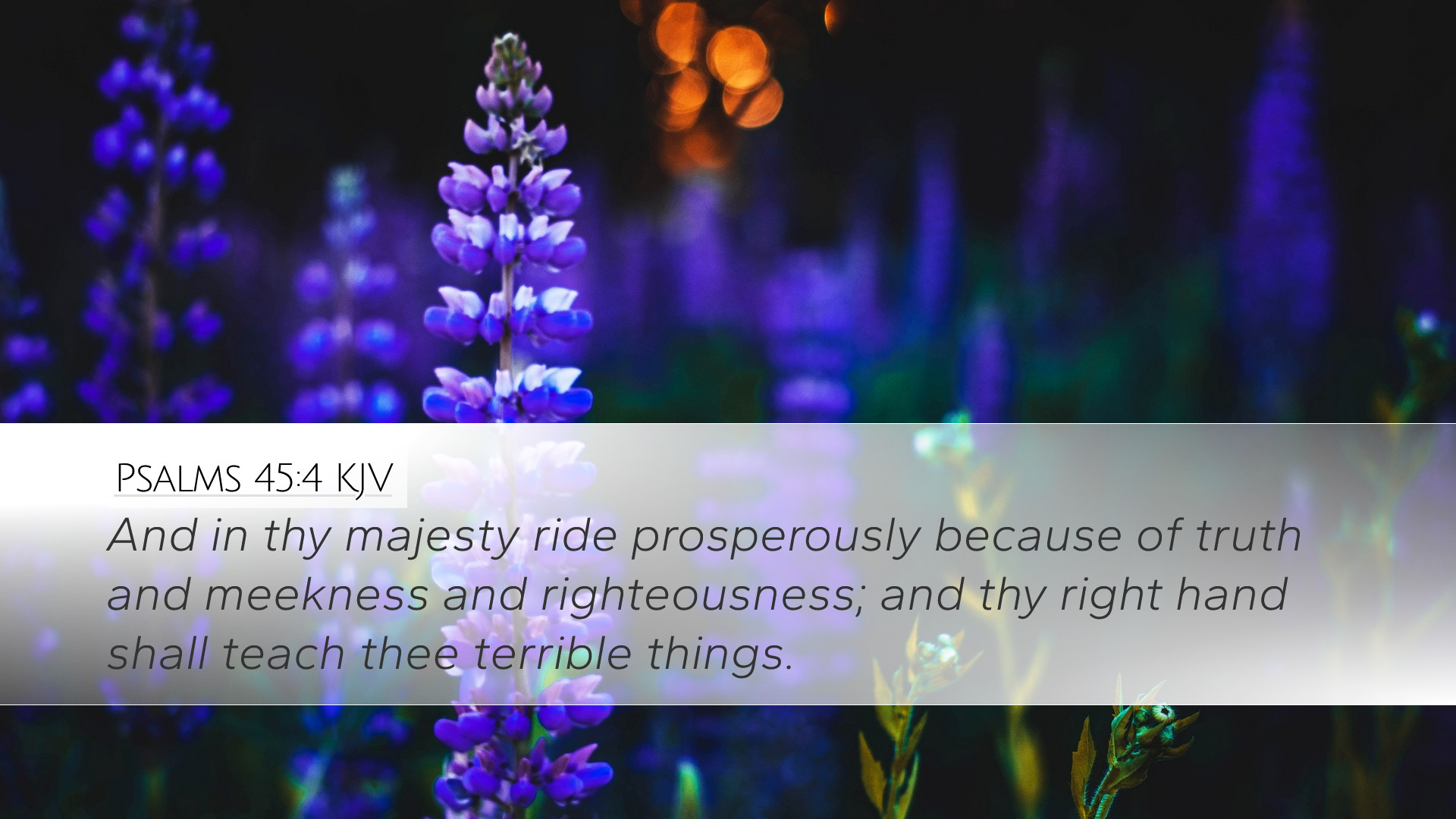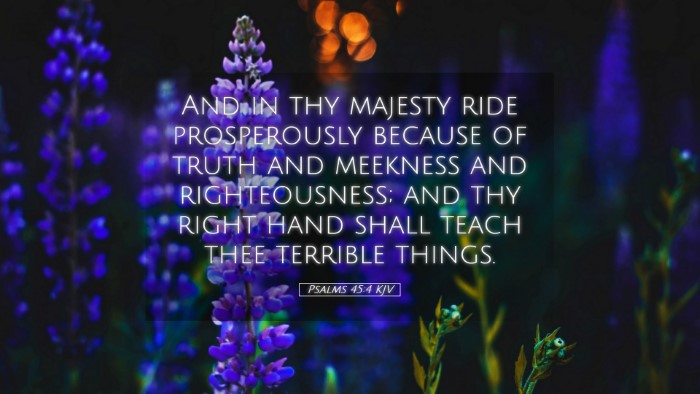Psalms 45:4 Commentary
"And in Your majesty ride forth victoriously in the cause of truth, humility, and justice; let Your right hand achieve awesome deeds."
This verse from Psalms 45 is rich in meaning and symbolism, often interpreted in relation to both historical context and messianic prophecy. It serves to encapsulate the powerful themes of divine authority, righteousness, and the enthronement of God's chosen king. Below, we explore commentary insights from public domain sources such as Matthew Henry, Albert Barnes, and Adam Clarke.
Contextual Background
This psalm is traditionally viewed as a royal wedding song, celebrating the nuptials of a king and his bride. The reference to majesty and victorious rides would resonate with audiences familiar with the ancient Near Eastern practices of kingship and conquest.
The King’s Majesty
Matthew Henry: Henry emphasizes the depiction of the king's majesty, stating that it signifies the divine right by which the king rules. His majesty is not merely an external display but a reflection of God's glory; a ruler who is truly majestic must be aligned with divine principles.
Albert Barnes: Barnes highlights that the king in this psalm can be seen as a type of Christ, who rides forth conqueror. The mention of majesty in verse 4 is associated with Christ’s victory over sin and death, reinforcing His sovereign rule. Barnes observes the importance of truth, humility, and justice in the character of a rightful ruler.
Adam Clarke: Clarke interprets the king as a typological representation of Christ, whose reign is that of righteousness. He notes that the majesty of the king here is directly linked to His ethical attributes, suggesting a divine endorsement of His reign.
Victorious Ride
The imagery of riding forth victoriously is a powerful one, connoting triumph over adversaries and the establishment of peace and justice.
Matthew Henry: Henry points out that the victorious ride indicates a conclusive triumph in the context of warfare. The king's progression serves as a symbol of God's intervention and support for His chosen one in battles against falsehood and oppression.
Albert Barnes: Barnes articulates that this victorious ride can be seen as a metaphor for spiritual warfare, where the king fights not only physical battles but also embodies the fight for truth and justice. His right hand achieving awesome deeds signifies the power of God intervening in human affairs.
Adam Clarke: Clarke expands on the concept of the king's victorious ride as indicative of the power of God accompanying His anointed. This emphasizes the spiritual essence of victory rooted in a divine mandate. The interpretation aligns God’s character with the responsible exercise of power.
Truth, Humility, and Justice
This phrase captures the ethical and moral compass of the king’s reign. Each of these qualities is paramount in establishing a government that reflects divine justice.
Matthew Henry: Henry articulates that truth indicates fidelity and faithfulness, humility reflects a servant leader’s attitude, and justice embodies the commitment to moral righteousness. These traits are foundational for any ruler who seeks to honor God in their authority.
Albert Barnes: Barnes asserts that the inclusion of humility as a virtue is particularly significant, as leaders often fall prey to pride and arrogance. The psalmist advocates for an ideal ruler who embodies these heavenly qualities, thus ensuring peace and security for the people.
Adam Clarke: Clarke draws attention to the interrelationship of these attributes, noting that true leadership must involve humility to enact justice effectively. In the messianic context, these traits serve as a foundation for Christ’s kingdom, reflecting God’s character and design for human leadership.
Awesome Deeds
The closing phrase "achieve awesome deeds" further encapsulates the grandeur of God’s intervention and the king’s role as an agent of divine action in the world.
Matthew Henry: Henry explains that these "awesome deeds" represent miraculous works performed by the king, guided by divine providence. Such acts not only benefit the ruler but also serve as signs of God's favor and power.
Albert Barnes: Barnes elaborates on how the “awesome deeds” anticipate acts of deliverance, healings, and manifestations of divine authority through the king’s reign. This, in the context of prophecy, aligns with expectations of the messiah’s accomplishments in the New Testament.
Adam Clarke: Clarke emphasizes that these deeds encapsulate the miraculous and powerful nature of God's work in the world through the mediator of the king. They reassure the faithful of God’s continual work among His people, driving back the forces of evil.
Theological Reflections
This verse invites profound theological reflection regarding authority, divine intervention, and the characteristics of leadership in both Old and New Testament contexts. It serves as a mirror for reflective practitioners in ministry and governance.
- Emphasis on Christ's Kingship: The verse is undeniably messianic, projecting characteristics that ultimately find their fulfillment in Christ, which holds significant implications for Christian theology.
- Leadership Characteristics: As spiritual leaders, pastors, and theologians reflect on these verses, they are called to model truth, humility, and justice in their own lives and ministries.
- Divine Assurance: The idea that God rides forth in majesty provides comfort and assurance to believers, reinforcing the belief in God’s active role in history and personal lives.
Conclusion
Psalms 45:4 stands as a reminder of the traits that define a godly leader, the promise of divine victory, and the ethical structures that govern righteous authority. Through the teachings of public domain commentators, we are invited to explore the deeper meanings of kingship and character that reflect God's desires for His creation.


